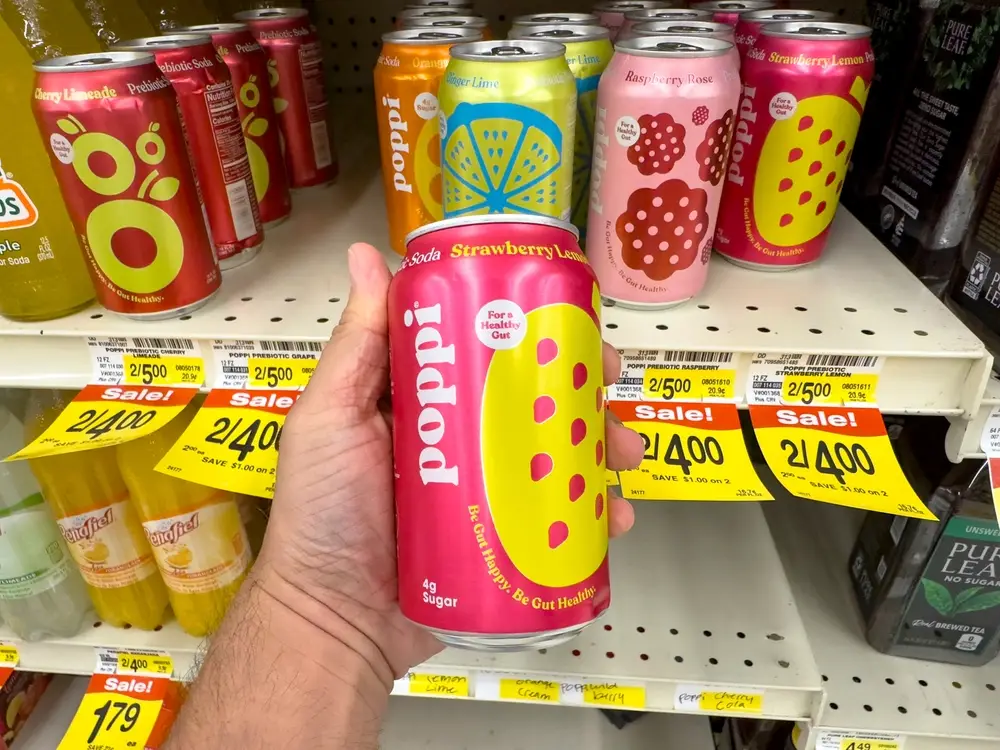Gut health has a huge impact on overall well-being, and consumers are willing to pay a premium for products that can help them achieve a balanced microbiome. Many have reached for Poppi beverages to help improve digestion, trusting in the product’s self-proclaimed “gut healthiness” and prebiotic contents.
But if you’ve ever purchased Poppi in pursuit of its purported health benefits, a recent class action lawsuit says you may have been a victim of deceptive marketing. Poppi denies the claims, but its current parent company, VNGR Beverage LLC, has tentatively agreed to an $8.9M settlement that should reimburse consumers who purchased the soft drinks because of misleading advertisements.
Is Poppi Really Gut Healthy?
With an ingredient list including sparkling water, organic apple cider vinegar, and natural flavors, Poppi often appeals to the health-conscious consumer. The beverage is certainly a better alternative to many full-sugar sodas on the market, but does it really offer concrete gut flora benefits?
Poppi formerly claimed so, citing the inclusion of two ingredients: organic agave inulin and cassava root fiber, both plant-derived prebiotics. Prebiotics are indigestible compounds that support the growth of beneficial microorganisms like certain bacteria. Through past advertisements, the beverage company marketed its soft drinks as “gut healthy,” convincing many consumers that the secret to a balanced microbiome was as simple as cracking open a can of Poppi.
The problem? These claims are not backed by science. Each can of Poppi contains just 2 grams of prebiotic fiber—an amount much too low to make any meaningful impact on gut health. In fact, an individual would have to down more than 4 cans to obtain the microbiome-balancing benefits boasted by Poppi. At that point, the amount of sugar they’d consume would “offset most, if not all,” potential benefits, the ongoing class action complaint contends.
What Do The Experts Say?
Experts wholly agree with the lawsuit’s allegations: Poppi isn’t a reliable solution to a healthy gut microbiome. “I don’t think we should be looking to soda or to processed foods to support our gut health,” Caitlin Dow of the Center for Science in the Public Interest told NBC News. The senior nutrition scientist continued, “Eating a diet rich in all of these other naturally occurring fibers—beans, vegetables, fruits, oats—that’s where you’re really going to get foundational support for your gut health. It’s not from a flashy soda.”
Registered dietitian and gut health specialist Rebecca Russell confirmed to Healthline that Poppi’s prebiotic fiber content is too low to provide the purported benefits. “It is thought that closer to 3-10 grams of prebiotic fibers a day is considered effective in altering the gut microbiome,” she states.
Another registered dietician, Tiffany Ma, agrees. Shockingly, Ma further explained to the publication that the added prebiotics in Poppi “may actually lead to unwanted gut symptoms such as gas, bloating, and loose stools as too much inulin, which is the prebiotic fiber included here, can potentially cause symptoms.”

The Legal Allegations & Poppi’s Response
Poppi’s former slogans, like “For a Healthy Gut” and “Be Gut Happy. Be Gut Healthy,” clearly conflict with expert opinions like Dow’s, Russell’s, and Ma’s.
So what does this mean for Poppi? Plaintiffs involved in the class action lawsuit believe it’s proof that the company falsely advertised its sodas, exaggerating their health benefits to mislead customers into buying products they normally wouldn’t have.
The lawsuit further alleges that Poppi:
- Contains too little prebiotic fiber to improve gut health,
- Has too high a sugar content to be considered gut healthy,
- And may even cause digestive discomfort due to its inulin content.
Poppi, however, continues to staunchly defend its product. “We are proud of the Poppi brand and stand behind our products,” the company told TODAY.com in June 2024. “We believe the lawsuit is baseless, and we will vigorously defend against these allegations.”
Despite this bold statement, VNGR Beverage LLC (Poppi’s parent company, though PepsiCo is slated to acquire the company) agreed to pay an $8.9M settlement to consumers who purchased Poppi beverages. The tentative settlement is currently pending approval from a federal judge. If approved, it will reimburse class members for Poppi products purchased between January 23, 2020, and the Settlement Notice Date (to be determined).
The settlement would allow consumers to claim up to:
- $0.75 per can
- $3 per four-pack
- $6 per 8-pack
- And $9 per 12- or 15-pack
Consumers without proof of purchase could receive a minimum of $5 and a maximum of $16, while those with proof could make an unlimited number of claims.
Poppi may view its actions as harmless, but plaintiffs see things differently. To them, this situation is yet another case of a large company promoting a product’s questionable “health benefits” to maximize profits. Plaintiffs believe the proposed settlement will provide class members with “meaningful and quick relief”—all while serving as an example to powerful corporations that mislead customers for financial gain.




Add Comment